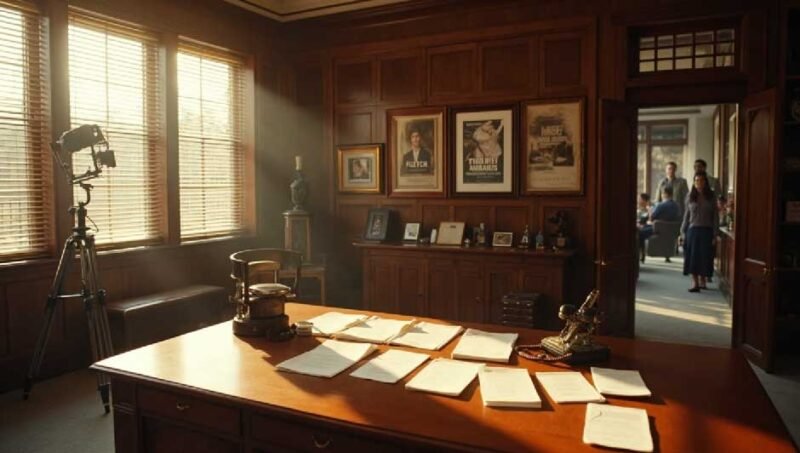Alan Greisman deserves special recognition as one of Hollywood’s most influential figures, even though he mostly worked behind the scenes. A New York City native born on September 4, 1947, he transformed the film industry with his exceptional producing talents and leadership skills.
Most casual moviegoers might not recognize Alan Greisman’s name, but his work has without doubt touched millions of lives worldwide. He produced hit films like “Fletch” (1985), “The Bucket List” (2007), and “Flipped” (2010) that deeply appealed to audiences. His masterpiece “The Bucket List,” starring Jack Nicholson and Morgan Freeman, made a global impact and proved Greisman’s talent to bring meaningful stories to the screen.
Greisman’s career reached new heights as Savoy Pictures’ president, where he managed numerous productions and distributions. His Hollywood connections extended to his personal life through his marriage to acclaimed actress Sally Field from 1984 to 1994. Their son, Samuel Greisman, picked up on this creative legacy and became a writer and director. This behind-the-scenes legend’s contributions have left an indelible mark on Hollywood filmmaking.
Early Life and the Spark for Storytelling
Alan Greisman’s legendary Hollywood career started nowhere near the glitz and glamor of Tinseltown. Born on September 4, 1947, in New York City, the vibrant mixture of the Big Apple – often called “the land of no sleep” – shaped his early life.
Murray and Beverly Greisman raised Alan in a loving and supportive family environment. He shared his childhood home with his two brothers, Gordon and Harold. This close-knit family unit later influenced his shared approach to filmmaking.
New York City’s bustling streets gave young Alan an early education in human stories and different viewpoints. His emerging interest in cinema and storytelling grew by a lot from this rich cultural upbringing. Many producers find their passion for film later in life, but Greisman’s love for storytelling showed up early.
New York City’s creative energy became part of Greisman’s DNA during his formative years. The city offered endless opportunities to see the power of narrative, from neighborhood theaters to street performances. These experiences became a great way to get knowledge as he guided himself through film production’s complex world.
Greisman’s steadfast enthusiasm for storytelling made him stand out from an early age. He showed a natural talent for narrative structure and character development while many of his peers were still finding their paths. This passion drew him to film production, where he found his true calling.
His early industry experiences, though challenging, helped him understand film production deeply. Greisman turned these early lessons into resilience and vision that would define his producing career, instead of letting the competitive business discourage him.
The values and viewpoints from his New York upbringing shaped the foundation of his remarkable career through Hollywood’s competitive scene. These early years continued to influence the types of stories he chose to tell throughout his career.
Breaking into Hollywood: Alan Greisman’s Career Start
Alan Greisman’s trip from aspiring storyteller to Hollywood producer started when he poured his steadfast dedication to narrative into film production. Born on September 4, 1947, in New York City, he ended up becoming one of the industry’s most respected behind-the-scenes figures.
Greisman’s original role in the film industry was behind the scenes. These early experiences gave him a complete understanding of production processes. This foundation period shaped his unique filmmaking style and laid the groundwork for his future achievements.
A major breakthrough came in 1984 when writer Gail Parent pitched her movie concept about a single date. Greisman saw the potential in this simple yet relatable story and connected Parent with director Armyan Bernstein. His ability to spot promising concepts and bring creative talents together became one of his greatest strengths.
Greisman’s suggestion for Parent and Bernstein to work together on the script ensured authentic male and female viewpoints. This thoughtful storytelling approach became his production style’s trademark throughout his career.
The film went through several working titles including “Date” and “American Date” before it ended up as “Cross My Heart”. Principal photography started on February 2, 1987, in Los Angeles and wrapped on April 2, 1987. The production schedule allowed sequential shooting since much of the film takes place over a single night in one location – a testament to Greisman’s strategic filmmaking approach.
His involvement with “Satisfaction” marked another pivotal early-career moment where he worked with a young Julia Roberts. This connection helped launch Roberts’ rising career, showcasing Greisman’s talent-spotting abilities.
The mid-1980s saw Greisman establish himself as a producer with “Fletch” (1985)[82]. He built his reputation by bringing character-driven stories to the screen. This foundation supported his later rise to prominence in Hollywood’s competitive world.
Producing Hits and Building a Reputation
Alan Greisman built his reputation as a versatile producer by making films that struck a chord with audiences and critics throughout his remarkable career. His big break as a prominent producer came with the comedy thriller “Fletch” (1985) starring Chevy Chase. The film turned out to be a huge commercial success. It made $50.60 million in North America and $9.00 million internationally, reaching a worldwide total of $59.60 million. The success continued with home video sales, bringing in $24.40 million in rentals.
Greisman’s next major success was “The Bucket List” (2007), which brought together the incredible talents of Jack Nicholson and Morgan Freeman. Rob Reiner directed this heartwarming comedy-drama about two terminally ill men who complete their wish lists before “kicking the bucket.” The story connected deeply with viewers worldwide. Reiner shared his perspective: “It’s really about discovering what’s important in your life… The most important things in life are your relationships with family and friends”.
He worked again with Reiner on “Flipped” (2010), a romantic comedy-drama set in the late 1950s and early 1960s. The film got mixed reviews at first and made only $4.30 million against its $14.00 million budget. Yet it later found its place as a cult favorite thanks to its authentic portrayal of teenage relationships.
Greisman’s impressive body of work features productions like “Soapdish” (1991), “Mr. Jones” (1993), and “Alex & Emma” (2003). His versatility shines through projects ranging from comedies like “Loose Cannons” (1990) to recent works such as “Freud’s Last Session” (2023).
Greisman stands out for knowing how to produce films in a variety of genres while delivering quality storytelling. Rob Reiner, who worked with him on several projects, explains: “For me, it’s books where the characters are well-drawn. With character-driven plots, you can tell a good story” – a philosophy that perfectly matches Greisman’s approach to filmmaking.
Conclusion
A Lasting Legacy in Hollywood
Alan Greisman proves how profoundly someone can shape the industry from behind the camera. This New York-born producer turned countless scripts into memorable cinematic experiences, yet rarely stepped into the spotlight himself.
His influence on Hollywood remains undeniable even though he worked mostly behind the scenes. Greisman’s talent for spotting promising stories, connecting creative minds, and guiding projects from concept to screen has permanently marked American cinema. Movies like “Fletch” and “The Bucket List” definitely show his expertise in producing commercially viable yet meaningful content.
Greisman’s dedication to character-driven storytelling sets him apart. He chose authentic narratives that struck a chord with audiences on a human level instead of chasing industry trends. His early years in New York City without doubt shaped this signature production style.
His versatility shines through comedies and dramas alike, demonstrating his deep grasp of cinematic storytelling. Greisman’s collaborations with directors like Rob Reiner created films that still captivate new audiences long after their original release.
Alan Greisman deserves recognition as one of Hollywood’s most influential behind-the-scenes legends, though he might not be as well-known as the stars in his films. His career shows that cinema’s most significant contributions often come from those credited after the spotlight fades.
Greisman’s legacy offers aspiring filmmakers a vital lesson – authentic storytelling surpasses passing trends. Box office numbers matter, but his lasting effect stems from his steadfast dedication to stories about fundamental human experiences. This focus on quality over flash means Greisman’s influence will shape Hollywood for generations.
FAQs
Q1. Who is Alan Greisman and what is his role in Hollywood? Alan Greisman is a renowned Hollywood producer born on September 4, 1947, in New York City. He has played a significant behind-the-scenes role in shaping the film industry through his exceptional producing talents and leadership skills.
Q2. What are some of Alan Greisman’s most notable film productions? Some of Alan Greisman’s most notable film productions include “Fletch” (1985), “The Bucket List” (2007), and “Flipped” (2010). These films showcase his ability to produce diverse, character-driven stories that resonate with audiences.
Q3. How did Alan Greisman’s early life influence his career in filmmaking? Growing up in New York City, Greisman was exposed to a rich cultural tapestry that sparked his interest in storytelling. His supportive family environment and the city’s vibrant atmosphere contributed to his emerging passion for cinema and narrative.
Q4. What is Alan Greisman’s approach to film production? Greisman is known for his commitment to character-driven storytelling and his ability to recognize promising concepts. He often connects creative talents and ensures authentic perspectives in his productions, focusing on stories that resonate with audiences on a human level.
Q5. How has Alan Greisman impacted the Hollywood film industry? Despite working largely behind the scenes, Greisman has significantly influenced Hollywood by producing commercially successful and meaningful films. His versatility across genres and dedication to quality storytelling have left a lasting impact on American cinema, inspiring future generations of filmmakers.








